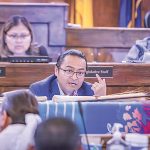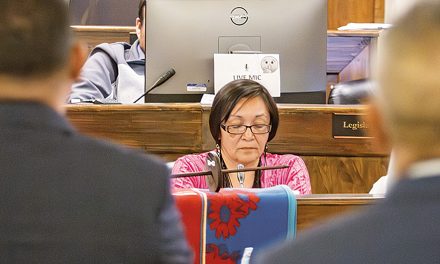
Funding for elite unit inches forward
WINDOW ROCK
In the 1990s, a new force in the Navajo Nation Police was formed: Navajo Criminal Investigations, better known as CI.
Under then-U.S. Attorney General Janet Reno, who served from 1993 to 2001, and during the Bill Clinton administration the new program came into existence under Operation Safe Trails.
Operation Safe Trails was four FBI agents who trained 12 Navajo Police officers in investigative techniques at the FBI Academy in Quantico, Virginia.
The first group of police officers became the first-ever criminal investigators, who were given vehicles, cell phones, computers, radios and video cameras the FBI had used in the field.
At the beginning, funded by the FBI annually for $200,000, criminal investigations was originally assigned to serve for two years. Reno envisioned the young group of Navajo Police officers would tackle major crimes on the reservation.
“Coordinated responses like the Safe Trails initiative are not only smart, but they are necessary,” Reno said in 1995. “The federal government does not have enough money to accomplish all it is asked to. We can no longer afford the old piecemeal approach to law enforcement in Indian country.”
The crime-fighting elite investigative unit seemed off to a promising start.
Twenty-seven years later, Criminal Investigations no longer has 12 investigators – it has 47.
It also no longer has an annual $200,000 budget. Supplies alone surpass that by $313,200, which the army of still-elite investigators added to its budget request to the Navajo Nation Council.
On Tuesday, Delegate Eugenia Charles-Newton, who told her colleagues CI were treated like “the redheaded child of (Navajo) Department of Public Safety.” She went to bat for them during the Naabik’íyáti’ Committee meeting and made the motion to add onto a bill almost $900,000 from the $3.5 million Permanent Trust Fund’s unmet needs.
In total, Charles-Newton ran with the department’s request for $881,197, which they hope will push a little funding into their overworked, poorly equipped department.
Mike Henderson, who was one of the first 12 investigators, is CI director and commands seven offices that all are in dire need of upgrading – from vehicles to laptops and lack of manpower.
Each of his investigators have a high number of cases. In addition, they’ve taken on the duties of a medical investigator as well.
Two of the department’s biggest supply needs are firearms and ammo and general operating supplies, both totaling a combined $80,000.
After that is a request to outfit their 50 police vehicles with $60,000 worth of tires.
In total, the budget request amounted to a measly $313,200 – pennies compared to what the three-branch tribal government is sitting on: $1.8 billion in ARPA funds, from which the president’s office and the legislative branch took about $180 million.
Somehow, Henderson managed to get by with a shoestring budget until COVID-19 hit the reservation last year.
Charles-Newton said since the COVID-19 pandemic began, the number of deaths the department investigates increased. She added that if a death did not occur in a hospital, the investigators had to investigate and send the bodies off for autopsy, which has become an expensive endeavor.
Currently, they have 22 cases that have incurred costs totaling almost $60,500 in autopsy fees. Charles-Newton explained it was CI that paid for the fees related to an investigation of a death.
“That is funding that’s taken out of the criminal investigations budget to help pay for some of these fees,” she said.
She added that the fees added up quickly, and it didn’t include funeral and burial services.
According to a 2019 fee schedule from the Coconino County Office of the Medical Examiner, costs started at $2,625 and went as high as $5,363.
And if their expert testimony was needed, they charge $303.30 per hour. All of which, the CI had to pay for.
And if CI was not able to pay for those fees, families most likely would end up with the bill.
“I just think about that family that’s in need that is having to do what they have to do to try to bury their loved one,” Charles-Newton said. “I just can’t imagine having to tell them that they’re going to have an additional $4,000 increase in their burying expenses because of an autopsy.”
But it wasn’t just funding that was being impacted, the investigators mounting caseloads continues to grow.
“The criminal investigations did reach out, they sat down with me and explained to me where they’re short and also where they need help,” she told the NABI committee.
Delegate Kee Allen Begay questioned some of the funding requests, specifically, on page five of the budget summary where the department requested $16,000 for catering and refreshments.
“Why are they asking for money when they’re asking to fund caterings and refreshments?” Begay asked in Navajo. “Why are we allocating $16,000 for the catering and refreshments. I guess you guys could probably justify that.”
He asked why the BIA couldn’t fund the department under the Public Law 93-638 funding.
“Certain funding in certain requirements that the BIA should be funding,” Begay said. “I believe that they should be funding this. Maybe have our legislative counsel look into this for me. If there’s anything that’s required in the ’638 contract.”
For Delegate Eugene Tso, the services CI provided the reservation were vital for families and victims. While highlighting his disappointments with how the Council seemed to be failing the Navajo people, he shared his own personal story.
“My older sister and my youngest sister both disappeared,” he said. “The oldest has been gone for a lot of years. One day they found her bones, by DNA her teeth we found out it was her. To this day, we have not been updated on what happened.
“And then my younger sister, she was taken away, got ran over by a vehicle and dragged over a hill, and got raped, and left out there in the cold, in January,” he said. “That’s how I lost my sisters and I feel strongly that we need to back up the CI, criminal investigators, so they can work with the FBI. We need to back them up so that we understand how these funds can be used.”
After a three-hour debate, Charles-Newton’s amendment was passed by the NABI committee, 19 in favor and two opposed.
The resolution goes forward to a special session, which began on Wednesday.
For the CIs, the work never stops, just like it never stopped when Reno created it in the 1990s.
“I am very proud of one DOJ project in particular involving Indian crime,” Reno said, who died in 2016. “The FBI, tribal police and the Arizona U.S. Attorney have come together as a team, sharing their resources and expertise in a dynamic law enforcement program attacking crime on the reservation.
“I want to expand this program in other districts, where appropriate, and expect the FBI to give requests for additional projects serious consideration,” she said.








 Highway 264,
Highway 264, I-40, WB @ Winslow
I-40, WB @ Winslow